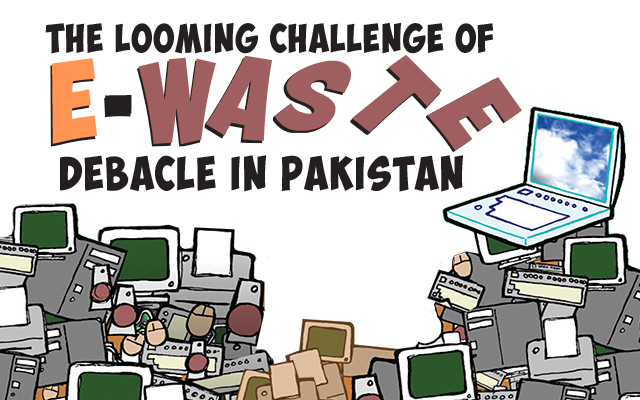The Looming challenge of E-Waste Debacle in Pakistan

The Looming challenge of E-Waste Debacle in Pakistan
Where do electronics go when they die? It is the most important question to ponder upon in current times but sadly just like many other environmental and general issues it is also the most neglected matter especially in third world countries like Pakistan. The level of awareness regarding the matter is very low, people do not have the slightest idea that what catastrophic consequences the looming clouds of e-Waste will bring in the future.
Now with rapid advancement in technology many consumers replace their electronic gadgets more frequently mainly in western countries like USA and United Kingdom
Now with rapid advancement in technology many consumers replace their electronic gadgets more frequently mainly in western countries like USA and United Kingdom. The dangerous part of this trend is that poor countries become the dumping destination of rich world’s trash. Pakistani is one of the main countries where large amount of e-Waste is generated. Developed countries in order to get rid of their undesirable and obsolete electronic goods send shipments containing tons of equipment every year to Pakistan for recycling and disposal. Karachi is considered the hub for electronic waste in Pakistan.
The disposing off of electronic waste is 10 times cheaper than recycling it locally but the damage that it is making in damping destinations is higher than anything else. E-Waste is a difficult type of waste and its recycling and dismantling is even more difficult.
Developed countries in order to get rid of their undesirable and obsolete electronic goods send shipments containing tons of equipment every year to Pakistan for recycling and disposal. Karachi is considered the hub for electronic waste in Pakistan
The e-waste recycling sector in developing sector is largely unregulated and the lack of technical knowledge about the e-Waste handling and management results in health and environment hazards in these countries due to the presence of e-waste heavy metals, Persistent Organic Pollutants (POPs), flame retardants and other potentially hazardous substances. The workers are the ones who suffer the most from e-waste hazards as they are exposed to risks that lead to physical injuries and chronic ailments such as asthma, skin diseases, eye irritations and stomach diseases. Particulate matter collected from e-waste recycling areas can even lead to inflammatory response, oxidative stress and DNA damage.
E-waste hazardous components that are burnt in lyari not only pollute the air but many of the chemicals from e-waste also seep in to the river which has turned black now
The health risk for overall population are also quite high and lead to breathing difficulties, respiratory irritation, coughing, choking, pneumonitis, tremors, neuropsychiatric problems, convulsions, coma and even death. E-waste hazardous components that are burnt in lyari not only pollute the air but many of the chemicals from e-waste also seep in to the river which has turned black now. Presence of the chemical substances in air and soil has endangered flora and fauna as well along with human life.
United Nations Environment Programme (UNEP) has released a report this year on illegal waste trafficking according to which up to 90 per cent of the world’s electronic waste, worth nearly US $19 billion, is illegally traded or dumped each year. The report states that every year electronic industry around the world generate up to 41 million tons of e-waste from goods such as computers and smartphones. If the current trend continued it is forecasted that figures may reach 50 million tons by 2017. Africa and Asia are the key destinations for large scale shipments of hazardous waste for dumping and recycling. In West Africa, Ghana and Nigeria are the largest recipients of e-Waste. Whereas in Asia besides Pakistan, China, Hong Kong, India, Bangladesh and Vietnam are bearing the e-waste problem.
Many countries already have implemented laws regarding e-waste and recycling management, strict rules are being introduced on imports of second hand electronics. Although Pakistan is a signatory to the Basel Convention on the control of Trans-boundary movements of hazardous wastes and their disposal but still no substantial initiatives have been taken so far. Pakistan Ministry of Environment (Ministry of Climate Change) demanded Rs1009.447 million for 24 projects but the planning commission rejected the long list of projects and only allocated Rs116 million for two ongoing projects.
United Nations Environment Programme (UNEP) has recently released a report on illegal waste trafficking according to which up to 90 per cent of the world’s electronic waste, worth nearly US $19 billion, is illegally traded or dumped each year
According to Planning Commission Minister Ahsan Iqbal, Environment Ministry was not able to convince the commission to allocation of funds. But according to inside source in the commission, the government’s main focus right now is the completion of China-Pakistan Economic Corridor (CEPC) project, therefore, it is cutting down budgets of all ministries and divisions. According to a senior official of Environment Ministry the Development Wing that is responsible for making project proposals is working under the supervision of a Joint Secretary of Ministry, who is not well aware of issues related to environment. He also stated that Pakistan economy is facing four billion dollars loss every year due to the environmental degradation in the country.
The level of consequences that our nation has to face due to certain problems result from the lack of seriousness from the government and not by the problem itself. Sadly decisions are not made until problem hits us in the face. Like every other issue, decisions will only be made once the damage is done and large number of adults and children start suffering from serious health disorders spread due to the exposure to lethal chemicals in e-waste. There is a dire need to enforce laws and regulations for the safe handling and disposal of e-waste in Pakistan. Many foreign companies have contacted Pakistan Environmental Protection Agency (Pak-EPA) and expressed their interest in working in the recycling industry by reusing e-waste in the country.
Although Pakistan is a signatory to the Basel Convention on the control of Trans-boundary movements of hazardous wastes and their disposal but still no substantial initiatives have been taken so far
The government should provide legal cover to the recycling business and support companies that are planning to start such businesses. Pakistan could earn millions if such initiatives are taken, besides that it will create thousands of jobs for the people while achieving the main objective of minimizing health and environmental risks.
PTA Taxes Portal
Find PTA Taxes on All Phones on a Single Page using the PhoneWorld PTA Taxes Portal
Explore NowFollow us on Google News!





